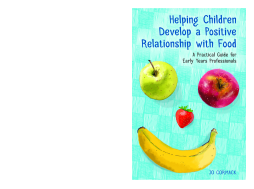
Additional Information
Book Details
Abstract
This simple, insightful resource explains how to help children develop a healthy relationship with food. Giving practical guidance on how to support lasting positive eating behaviours in children, it includes valuable information and advice about how to resolve issues including fussy eating, obesity, and special needs related feeding difficulties.
As a pediatric dietitian working with families on a variety of feeding issues, I am so thrilled Jo's book is now available ... I hope to see this timely resource on the desk of each child-minder, preschool and nursery teacher in the UK and beyond.
Natalia Stasenko MS, RD, Feeding Bytes
Comprehensive guidance that will support the personal, social and emotional development of young children ... Both early years professionals and parents would benefit from reading this book.
Emma Bacon, Author of Rebalancing Your Relationship with Food
Jo Cormack's book Helping Children Develop a Positive Relationship with Food does just that! [It] makes caring for children easier and more satisfying, and children will eat better for it. It's a win-win.
Jenny McGlothlin MS, CCC-SLP author of Helping Your Child with Extreme Picky Eating
Jo Cormack is a paediatric feeding consultant, registered counsellor, and doctoral student in feeding children at Bishop Grosseteste University. She runs the online blog Emotionally Aware Feeding, and is a mum of three.
If we are to tackle the obesity epidemic and, more importantly, build self-esteem and body confidence, we need to start working with young people from a very early age ... Cormack provides many practical ways to provide this nurturance, offering creative solutions to eating problems in young children and embedding these solutions within the practice of early years professionals. Case studies bring the book to life, making it accessible and very user-friendly. While it is aimed at professionals, I would recommend it to parents too.
Dr Nicola Davies, Health Psychologist, Counsellor, and Author
Only a few books have changed the way I think and Helping Children Develop a Positive Relationship with Food is one of them... Before reading it, I honestly thought I knew what I was doing in terms of how to provide food for a child, but Jo Cormack's book has flipped my opinions upside down and enlightened me to perhaps a more sensible and positive approach.
Special Educational Needs Resources Blog
Table of Contents
| Section Title | Page | Action | Price |
|---|---|---|---|
| Helping Children Develop a Positive Relationship with Food: A Practical Guide for Early Years Professionals by Jo Cormack | 3 | ||
| Acknowledgements | 8 | ||
| Introduction | 9 | ||
| Section 1: All about a good relationship with food | 13 | ||
| 1. What is a positive relationship with food and why does it matter? | 14 | ||
| 2. Self-regulation | 18 | ||
| 3. The division of responsibility model | 23 | ||
| 4. Variety and exposure | 28 | ||
| Section 2: Under pressure | 33 | ||
| 5. What is a controlling feeding style? | 34 | ||
| 6. Why is being controlling unhelpful? | 39 | ||
| 7. Attention and praise | 42 | ||
| 8. Who knows best? Learning to trust children | 46 | ||
| Section 3: Food and feelings | 49 | ||
| 9. Understanding emotional eating | 50 | ||
| 10. Rewarding and punishing with food | 53 | ||
| 11. How we talk about food | 58 | ||
| 12. Reflecting on your own relationship with food | 62 | ||
| Section 4: Implications for practice: Fostering a positive relationship with food | 67 | ||
| 13. Structure | 68 | ||
| 14. Content | 72 | ||
| 15. Serving family-style | 78 | ||
| 16. Staff training | 81 | ||
| Section 5: Your food ethos | 87 | ||
| 17. The eating environment | 88 | ||
| 18. The social side of eating | 93 | ||
| 19. Modelling | 97 | ||
| Section 6: Nutrition and healthy eating | 101 | ||
| 20. Healthy eating and the EYFS Framework | 102 | ||
| 21. Fun not fear: How to teach about nutrition | 105 | ||
| 22. Your food policy | 110 | ||
| Section 7: Working with parents | 117 | ||
| 23. Being a team | 118 | ||
| 24. Empowering without blaming | 123 | ||
| 25. Understanding eating skills | 127 | ||
| 26. All about drinking | 133 | ||
| Section 8: What we can do away from the table | 137 | ||
| 27. The power of play | 138 | ||
| 28. Helping children engage with their food | 143 | ||
| Section 9: A closer look at picky eating | 147 | ||
| 29. Picky eating: Is there really a problem? | 148 | ||
| 30. What is behind picky eating? | 152 | ||
| 31. Core principles when working with picky eaters | 157 | ||
| 32. Strategies to help picky eaters | 160 | ||
| Section 10: Special cases | 163 | ||
| 33. Avoidant restrictive food intake disorder | 164 | ||
| 34. Allergies and intolerances | 167 | ||
| 35. Autism Spectrum Disorder | 170 | ||
| 36. Sensory processing | 174 | ||
| 37. Oral motor skills | 177 | ||
| 38. Obesity | 180 | ||
| Section 11: A case study | 183 | ||
| Nurture Early Learning, New Zealand | 184 | ||
| Final thoughts | 190 | ||
| Resources | 192 | ||
| References | 195 | ||
| Notes | 200 | ||
| Index | 203 | ||
| Blank Page |
